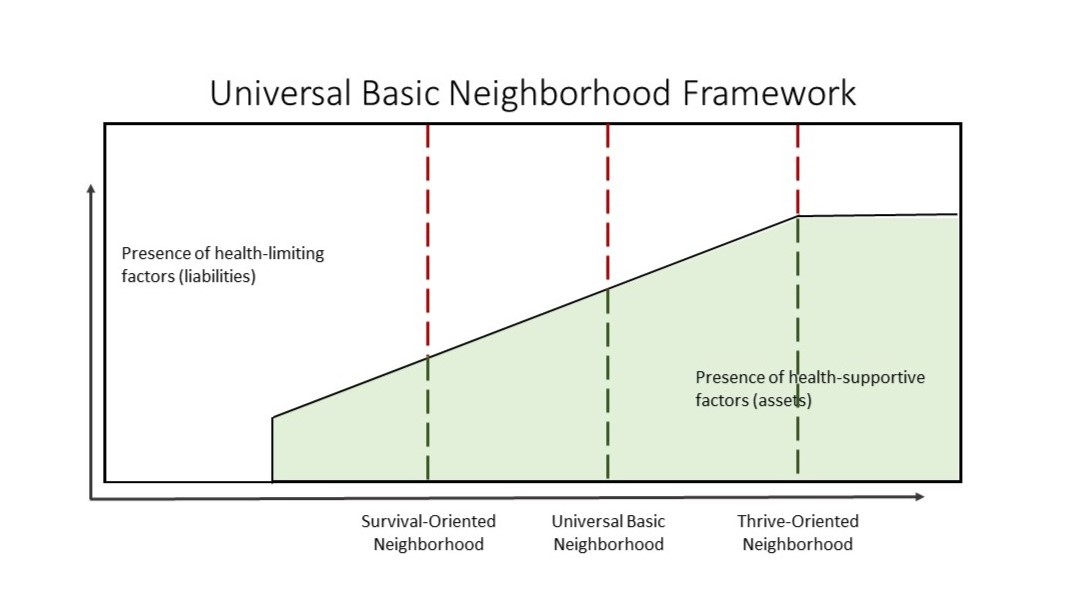Universal Basic Neighborhood
Universal Basic Neighborhood
Building Healthy Communities Based on Foundational Strengths
 There is broad understanding that small geographies, such as zip codes or neighborhoods, have profound impacts on the health outcomes of all the people who live there. However, the civic investments, supportive assets, protective characteristics, and environmental risks that drive health outcomes are not evenly distributed. The social determinants of health, county health rankings, and other health equity work has raised awareness about the need to address health disparities through broad coalitions. However, this understanding about broad action has not translated to population-level or place-based interventions grounded in community strengths.
There is broad understanding that small geographies, such as zip codes or neighborhoods, have profound impacts on the health outcomes of all the people who live there. However, the civic investments, supportive assets, protective characteristics, and environmental risks that drive health outcomes are not evenly distributed. The social determinants of health, county health rankings, and other health equity work has raised awareness about the need to address health disparities through broad coalitions. However, this understanding about broad action has not translated to population-level or place-based interventions grounded in community strengths.
To make gains towards health equity, instead of diagnosing and treating individuals, the Robert Wood Johnson Foundation awarded us, jointly with Simmons College of Kentucky, a “Pioneering Ideas” grant for an 18-month project to consider how key components of neighborhoods are the true drivers of health inequities.
A universal basic neighborhood (UBN) is one that supports individuals and families by addressing the basic human need to live in a place without toxic factors and with the natural, social, and economic resources to support healthy growth and aging. The UBN concept offers a promising framework for incorporating and building upon neighborhood assets and strengths when developing interventions to improve health.
Major Activities
Develop Baseline Framework: Evaluate health-related factors and frameworks that investigate health and place to develop a baseline framework for a Universal Basic Neighborhood (UBN).
- See the data sources for the UBN Framework here.
Legal & Policy Review: Conduct a legal and policy review to identify potential pathways and hurdles towards policy action to develop model legislation and guidance supportive of a UBN.
Field Study: Conduct an IRB-approved field study including surveys, asset mapping, and focus groups in two demographically and economically distinct neighborhoods to understand the fabric of each place and to discover neighborhood assets directly from community members.
Calculate Historic Investments & Impacts: Evaluate 25 years of neighborhood plans, city budgets, and related variables to calculate civic investments and impacts, understand what forces move neighborhood planning from vision to implementation, and understand if and two what degree civic investment promotes community well-being.
- The Neighborhood Plan Check In evaluates 25 years of civic investment and neighborhood planning in two Louisville neighborhoods to understand the impact of investments on neighborhood plan progress.
- The UBN Action Plan is a practical guide that translates the UBN framework into actionable steps to create healthier, more equitable neighborhoods.
Comparative Analysis of Louisville Neighborhoods: Conduct a comparative analysis of two Louisville neighborhoods to illustrate how, and to what degree, basic neighborhood factors are present or not present and differentiate between factor areas that drive health outcomes.
Reporting Back Results
In February and March of 2025 the project team met with residents in Russell and Crescent Hill to report back findings of the UBN study. Please see below for the presentations from these events.
- Neighborhood Plan Check In Presentation
- Legal and Policy Analysis Presentation
- Qualitative (Survey, Focus Group, and Interview) Results Presentations for Russell and Crescent Hill
- UBN Framework Presentation for Russell and Crescent Hill